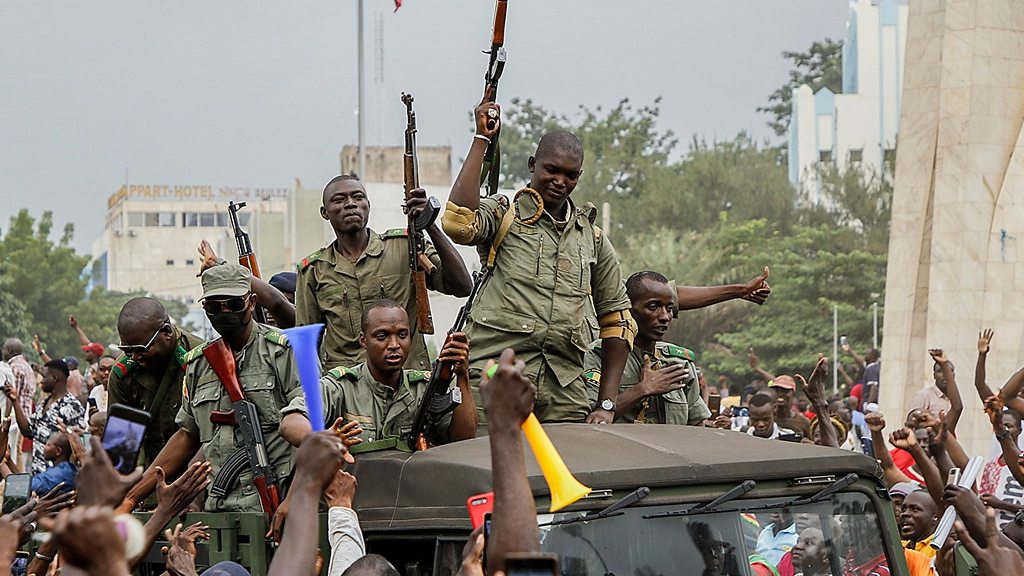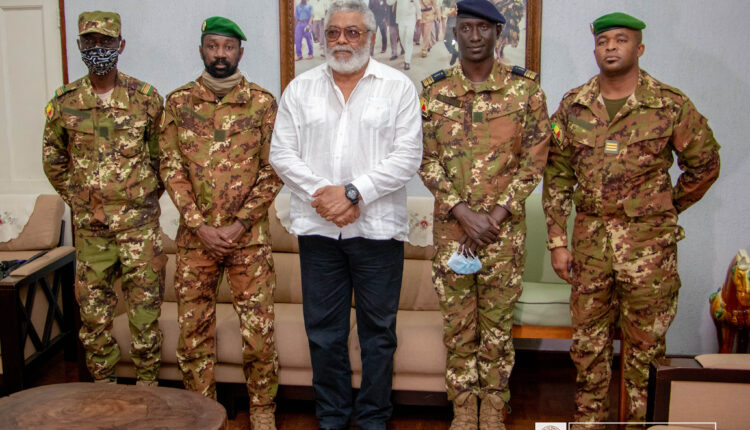Use transition to fight corruption – Rawlings tells Mali coup makers
After two successul coups and two terms in office as a civilain leader, former President J.J. Rawlings has mastered the game of managing a country after a coup-d’etat.
He did not hold back the lessons when leaders of the Malian military regime paid a courtesy call on him on Tuesday.
He urged the leaders of the Malian military junta to use the transitional period to fight corruption and injustice.
“The level of corruption that has become an integral part of multiparty democracy has created a general climate of stress and tension that may destabilize some areas in our region,” he told the Malian military leaders who paid a courtesy call on him in Accra on Tuesday.
A self-acclaimed apostle of anti-corruption who led three military coups with two successful ones in 1979 and 1981, the former head of state said it was unfortunate that “the world is being forced into multiparty democracy with corruption and violence rather than other forms of democratic practices with none or minimal corruption.”
“Unfortunately, the West appears to favour corruptible political tendencies in order to continue to dominate our security and economy,” the former President stated when the four-man delegation of the National Committee for the Salvation of the People (CNSP) led by its Chairman, Colonel Assimi Goïta, called on him

The Malian military led by 37-year-old Col Assimi Goïta on August 18 tossed out Malian President Ibrahim Boubacar out of office with the tacit endorsement of an angry civilian population.
Before then, Col Goïta had been commander of a special forces battalion based in Mali’s Center region.
On Tuesday, President Nana Akufo-Addo and his equals in ECOWAS met the military leaders to charter a path for the country’s return to democracy.
After the closed-door session, the ECOWAS leaders issued a communique.
READ: Mali Coup: ECOWAS Communique Details 6 Points For Civilian Handover
A day after their meeting, the Malian military régime leaders sought audience with the former President who inspired a number of young coup-makers in West Africa in the 1980s and 1990s.
When Captain Valentine Esegragbo Melvine Strasser overthrew President Joseph Saidu Momoh on April 29, 1992, military coup to become the world’s youngest head of state, he took inspiration from Rawlings and sought advice from him.
So did former Gambian leader, Yahya Jammeh in 1994 toppled Sir Dawda Jawara. The 29-year old called on Rawlings to seek legitimacy and ways to stabilise the impoverished West African nation.
Rawlings also had close relations with the late Nigerian dictator, Gen Sani Abacha.

When the young Malian military leaders rode into Bamako on August 19, the cheers were wild and went deep into the night.
Col Goita’s message was simple.
“Mali is in a situation of socio-political and security crisis. We no longer have the right to make mistakes. By making this intervention yesterday, we have put the country above [everything]. Mali first,” he said of the reasons that compelled the coup.
He repeated the Malian quagmire when he met Mr Rawlins who led Ghana for 19 years, 11 of those years as a military leader.
With those experiences behind him, he urged the new leadership in Mali to use the transition period to exhibit exceptional leadership for the country and usher it into a prosperous era.

Known for his mobilisation skills that led to the evacuation of thousands of locked up cocoa bags in the hinterlands in the Provisional National Defence Council days in the 1980s, Rawlings also rallied the military leaders to mobilise their people into taking up productive activity through a positive vision to boost the country’s development.
He also advised them to empower and encourage the people to own their political climate and to improve on the quality of multiparty democracy that Western powers “have hung around our necks”.
He said he was dutifully passing on ECOWAS leadership’s concerns while sharing his own political experiences and observations.
Colonel Assimi Goïta was accompanied by Colonel Ismaël Wagué, Major Talibe Konte and Captain Demba N’daw. Also present was the Malian Ambassador to Ghana, Abdoul Kader Toure.




